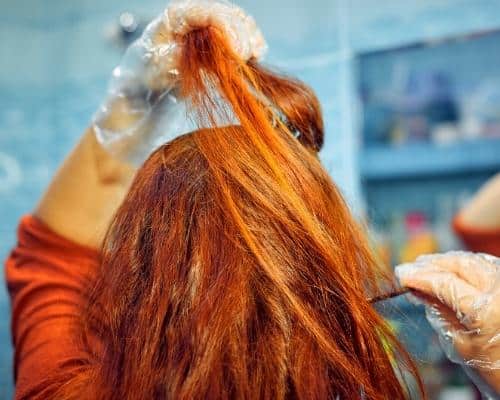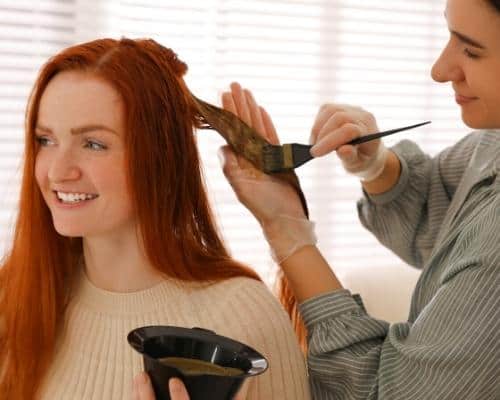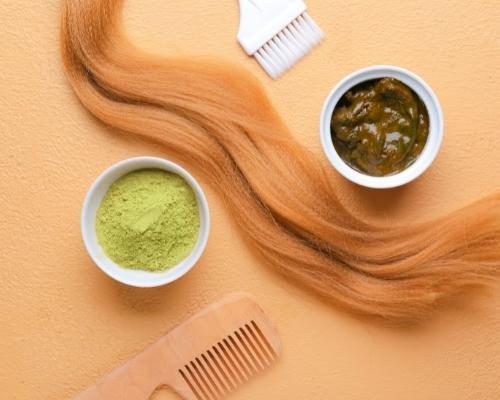Gone are the days of enduring hair damage for the sake of beauty, thanks to henna!
But while many people are satisfied with the wonderful effects of henna, there are still others who are not as thrilled.
In fact, some stopped using henna as hair dye.
So does henna really have its downside?
Read along to find out.
Henna ruined my hair!
Okay, let’s get this straight — pure, or natural henna does not harm the hair. It nourishes the scalp and prevents split ends since it contains natural antifungal and antimicrobial properties.
Natural henna is a plant-based dye coming from the mignonette tree. Henna leaves contain a natural coloring pigment that creates henna stains.
And since it’s a natural herb, it does not contain harsh chemicals like ammonia and peroxide. So you won’t have to worry about damaging your hair strands.
Once it deeply penetrates the roots, it will make the hair soft and shiny.
However, utmost care is required if you’re applying henna to dry and frizzy hair.
If your hair is dry and frizzy, it’s best to mix henna with moisturizing ingredients or apply oil right after. This will help replace lost moisture during the dyeing process.
But if indeed henna ruined your hair, then you might have actually applied black henna.
It’s okay; you’re not alone!
Most people end up buying pure black henna, thinking that it is natural henna. But in reality, this kind of henna damages the hair.
Black henna, also known as “Kali Mehndi”, contains high levels of paraphenylenediamine (PPD). This ingredient is the primary reason why black henna quickly gives off a dark color. But this is also the very reason why you should avoid black henna.
Since it has high levels of PPD, black henna can make the hair thin and brittle. Not to mention, it can also cause swelling and redness of the scalp.
So when buying henna, it’s always best to check the label first and look out whether it has paraphenylenediamine.
How to determine pure henna?
Okay, let’s say if you’ve purchased one, but you’re doubtful whether it’s pure henna or not.
Well, knowing if it’s pure or not is quite simple. Pure henna is orange in color with a brown or red tint, while black henna, from the name itself, is pure black.
Why is henna not good for hair?

Pure henna is beneficial for the hair. But while it is safe to use, there are specific guidelines for various hair types.
Curly hair
Applying henna might leave the hair dry and crunchy for curly homies out there.
To avoid this, try mixing henna with herbal teas. Never use true teas, though. Mixing henna with coconut milk can also make the hair smooth and shiny.
Also, henna may loosen your curls. This is one of the reasons why some curly-haired gals stopped using henna.
So to prevent this from happening, try mixing 1 tablespoon of organic amla powder to retain the curls. For extra dry, coarse hair, shea or cocoa butter, olive oil, avocado oil, or argan oil will help moisturize the hair.
Fragile hair
Breakage appears to be the common problem for fragile tresses. Smooth henna paste will save you from this disaster.
Herbal teas will also help condition the hair. And for extra slip, you can also add organic aloe powder.
Normal hair
Those with natural hair can follow the guideline for fragile and curly hair. However, you should lessen the amount of oil and heavy butter to use.
Also, use only coconut oil and argan oil. You can use herbal teas and organic aloe powder for extra moisture and slip.
What are the disadvantages of henna?

While henna is a good alternative for conventional hair dyes, it still has disadvantages. Nothing’s perfect, after all.
Below are the cons of using henna as hair dye:
1. Henna takes time to develop
Patience is a virtue when it comes to dyeing your hair with henna. Unlike traditional hair dyes, which take about an hour to develop, henna will take you about 1 to 6 hours.
2. It can get messy
Henna has a muddy texture, so the application can be messy. That’s why it’s best to dye your hair in the bathroom so you can easily clean the drips.
Also, henna can stain the skin, so try applying some cream or balm beforehand for protection.
3. Henna does not even out your hair color
Henna won’t cover the pre-highlighted parts of the hair.
You will still have those highlights even after the dyeing process.
4. It darkens the hair over time
This usually happens if you continuously apply henna to your hair.
Remember: the darker the hair, the harder it will be to go lighter.
5. Changing to new hair color is a challenge
Henna with metallic salts reacts badly to chemical treatments. So make sure you’re using one that does not contain metallic salts. Otherwise, you can’t apply chemical hair dyes over them.
Also, lifting henna out of the hair will take some time. It will be tough to remove henna.
Immediately shifting to a different color, particularly lighter ones, won’t be feasible. This is also one of the major reasons why people stopped using henna.
I mean, not changing your hair color for a long time can get a little frustrating, right?
So if you’re the kind of person who loves experimenting with various hair colors, then henna may not be for you.
6. Lingering smell
Since henna is plant-based, it naturally smells grassy and earthy. This smell will linger for quite a while.
However, adding essential scented oils to the henna mixture will help alleviate the smell.
Does henna stop hair growth?

No. Anyone who says otherwise is telling a lie.
In fact, the natural properties of henna encourage hair growth.
Hair fall is normal for first-time users. So don’t fret! These are just damaged strands falling out.
With constant use, you’ll definitely notice how fast your hair grows.
Why is my hair so dry after using henna?
As mentioned before, it is black henna that dries out the hair.
However, if your hair becomes brittle, coarse, and unmanageable despite using pure henna, blame it on the hair’s physical structure.
This has nothing to do with the ingredients of pure henna.
During the dyeing process, the acidity and moisture of the henna paste transfer to the outer layer of the hair. The dye binds to the keratin and oxidizes. Once oxidized, the residue of the paste leaves out a feeling of dryness.
But fun fact, this sensation isn’t exactly hair dryness. It’s more of a temporary change of hair texture, particularly on the surface of the strands.
Just wait for a couple of days, and your normal texture will definitely come back. You can also condition your hair or apply apple cider vinegar to speed up the process.
Also, the change of hair texture reinforces and strengthens the tresses. So using henna as a hair dye is more of a pro than a con.
CHECK OUT: How long does henna hair dye last
The takeaway
Natural henna contains no harmful chemicals, so it does not damage the hair in any way. However, adverse reactions may still be a possibility.
That is why, as much as possible, only purchase henna from trusted and reputable brands.
Also, learn how much henna does your hair need. Even if it’s safe to use, overuse of the product will not be good for the hair. Too much of a good thing can be harmful.
Assess your preference too! If you like switching from dark to light hair colors from time to time, then it’s best to take a step back from using henna hair dyes.
Lastly, stay away from black henna. Otherwise, you might end up with brittle hair or, worse, a burnt scalp.

